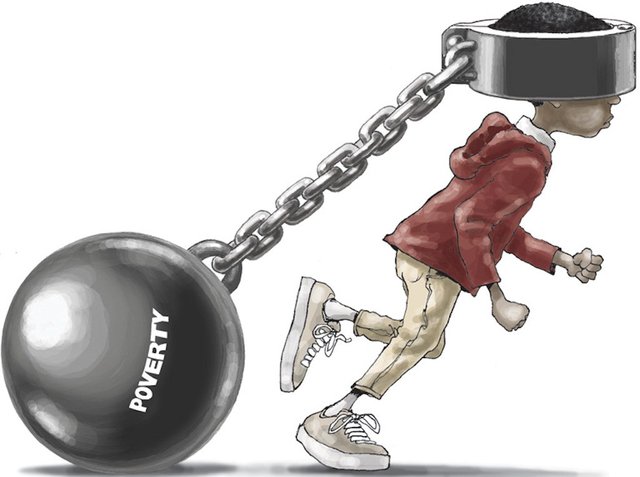The poverty trap
For the longest time I've been listening to the voices of the right wing talking about the poverty trap and I must confess that every time the subject would come up, I wold somewhat dismiss it as fear mongering. That being said, lately I'm starting to see the validity in the argument, and how the current american safety net is actually one of the reasons why we've not moved past the hurdle.

img src
It comes down to incentives
We can break it down, flip it upside down, talk about racial tensions, etc, but at the end of the day it really just comes down to the system of incentives. In other words, if people think it's better to stay impoverished to be able to secure their benefits, then they will.
The idea that people are poor because they want to be, or because they are lazy, is both wrong and in my opinion socially destructive. Nobody who is of a sound mind wants to be poor, but it's hard for someone who is living in scarcity to be able to think long term and the system that is currently keeping their head above water is designed, possibly unintentionally, to keep them there.
I for one have been listening to somewhat dumbed down ideas of why poverty exists for as long as I can remember. Most of these notions, sometimes even spewed by economists, fail to take into account that the system is not only corrupt, but also evolved from socio-economic policies that believed that poverty is not just inevitable, but necessary.
No poverty, no work?
There are some economists in history and even some philosophers, who believed adamantly that keeping a percentage of the populous poor was key. This would ensure that they would remain hard workers, since without a need to work they would just stay home and do nothing or worse.
Think about this for a minute, think about how twisted this notion is, the idea that without poverty, without a need for people to work to stay alive, they would just devolve into wickedness and self destructive behaviors. There is possibly no way to state such a dehumanizing lie in a more wretched way.
There's enough
And that is why this subject is currently so important, and so powerful. Because today we don't live in that scarcity of centuries ago, and even though we have been moving the needle in the right direction, there is absolutely no reason why we've not slain the dragon of poverty.
I remember my mother telling me when I was still a child, that the Vatican had enough resources to end world poverty in a split second. I may have been too young to understand economy, and more so logistics of such endeavor, but it made no sense to me back then why the "force for good", chose to not to good, or not do enough.
However, even if we scrap the idea that religious institutions who are supposed to be altruistic, should be altruistic, we still stand in a world of abundance. We've perfected our production of food to the point that it's become cheap in most modern societies and we are now even tackling obesity as a result of this abundance. That being said, the mentality of scarcity is still alive and well, and this is the one monster we've not figured out how to truly kill.
Circling the wagons
But back to my initial idea behind this article. How do we begin to pull people from poverty? Well, it seems obvious to me that the poverty trap must be destroyed, and the system of surveillance that has been edified to make sure that the poorest among us are poor enough to receive help, should altogether be erased from our memory.
Think about the fact that we have all that bureaucratic layers of fat, who's sole task is to make sure that poor people are poor enough, and to punish them by removing aid, if they improve their way of living. If that does not make your stomach ache, then I guess I've failed to deliver the message.
So what's the answer, you ask? It seems to me that Friedman had the best idea out there, and to think that even Nixon wanted to implement it, just baffles my mind a bit. Arguably the worse president the US ever had, almost implemented the solution to poverty.
I realize a good percentage of people recoil to the very idea of UBI, and wrongfully equate the idea with socialism or communism, but have not taken the time to learn that economists like Milton Friedman, considered by many to be a leader of libertarian thought, advocated for it's necessity.
Maybe it's time to scrap the current system after all.

Israel addresses this issue, actually relatively well. At least when it comes to incentivizing disabled people to find work.
It basically works like this: those who get disability benefits (about 1K$ a month, after the recent rise), will have substantially more money if they earn a salary (or have their own business) alongside the benefits they get.
The increase in earnings is guaranteed, because for every X Shekels a disabled person earns, only Y Shekels will be deducted from their disability benefits. While, obviously, X > Y at every bracket.
And from what I know, most people on disability do want to work here, despite being somewhat able to just live-off these benefits.
Maybe the US can learn a thing or two from this.
Posted using Partiko Android
that is quite fantastic, I had no idea this was the case and it makes absolute perfect sense in my view. I mean, now that I've gone down this rabbit hole, these ideas of safety nets that don't prevent but actually motivate upward movement seem to be so obvious, I can't help but to think we are ignoring them purposely.
Well, it's not unthinkable that republicans are willing to pay more taxes now,in the hope for massive tax cuts in the future.
A lot of biased people want the currently inefficient system to stay in place, instead of fixing it. Because then, they might be able to dismantle it, and redesign it, so that it will work best for THEM...
Posted using Partiko Android
Excellent review @meno and understanding of all this machine of the American social bureaucracy, I will say simply, the fed will never understand the hungry!
I agree with you, @meno. A system or country does not have to turn socialist or communist to be fair and provide its people with decent living conditions, which I'm sure would encourage them to work even harder to keep those living conditions and even improve them even further.
What socialism and communism add to the equation is repression and forced ideology where far from eliminating poverty they need to keep it and increase it.
Only the destitute would rely on the state to support them since on their own they would be unable to climb up the social ladder (once the state has extended its tentacles across every economic, social, and cultural activity).
I think that regardless of the political system that rules (democracy, monarchy, communism, dictatorship), it is human ambitions and follies what ends up imposing themselves over the wellbeing of the masses.
Leaders wrongly believe that they need to empoverish to control, and the empoverished masses wrongly believe they can't do anything about it.
it's a toxic symbiosis!
This is the true power of decentralization: it is freedom. The extant economic model is based on industrial production, which creates centralized pools of wealth and power by extracting rent from every transaction to acquire goods and services from industry. The cutting edge of every technological field today is decentralization. Every field.
This notably makes the rentier model of centralization obsolete, by no longer enabling rent to be extracted from production of goods that people just make themselves. Decentralization of the means of production is literally freedom.
We need to keep the wolf of war at bay a little longer, to enable decentralized technology to propagate and develop further, until it becomes unstoppable and it's viral propagation will continue until centralization has been completely replaced. Then the idea of poverty will no longer exist, as the means of production won't only be accessed via wages that are parasitized, but owned by individuals who retain the economic benefits of their labor entirely. If there's no transaction, there's no ability to parasitize it. No wages, no sales, no taxes.
Decentralization is freedom.
There's this book I've been reading... It's called Utopia for realists, I think you would really enjoy it.
I'll have a look.
Thanks!
I have seen both sides very closely and behaviors for most are hard to predict which means that one straight cut system will never work. I truly believe that even if we distribute wealth equally around the world, we will still have social classes.
Posted using Partiko iOS
I don't believe in wealth distribution in that sense because it's literally against our human nature. Distribution of anything is never equal, and we can't fool ourselves to think that it ever can. Social responsibility is another subject all together, but truthfully creating a system that is safer for more impoverished people is also good for those with wealth, simply because it actually boosts value production and it also creates safer societies.
Greetings @meno
Interesting your publication The best way to include people in the production system is through training, generating study opportunities for people, especially low-income people. We are living in a world where information every day takes value, but if we are not able to receive, analyze and respond to information, we will be displaced in the system. An example of ignorance, as you raise in your publication is food, nowadays and due to advances in the areas of food processing, people are fed more than before, so much so that now they have obesity problems, situation Controllable with a nutritional education. Training and studies are important elements that must be implemented in the new social systems, guaranteeing more efficiency and balance. The obsolete systems of today are generating many faults and must be changed.You are definitely right, the way the current system works is to keep the poor bearly surviving and push them down when they try to get out with huge amounts of bureaucracy and taxation... I often say that the difference between third world countries and developed countries is just one, both have whirlpool systems in place to make the poor even poorer, but in developed countries the poor are kept floating with the help of ropes, in third world countries there are no such ropes, and the poor just go deeper and deeper into poverty until the country finally breaks...
I really need to look more into UBI, I've seen great UBI projects in the crypto space and I still know only the basics of it...
To listen to the audio version of this article click on the play image.

Brought to you by @tts. If you find it useful please consider upvoting this reply.
Hi @meno!
Your post was upvoted by @steem-ua, new Steem dApp, using UserAuthority for algorithmic post curation!
Your UA account score is currently 5.988 which ranks you at #325 across all Steem accounts.
Your rank has not changed in the last three days.
In our last Algorithmic Curation Round, consisting of 191 contributions, your post is ranked at #17.
Evaluation of your UA score:
Feel free to join our @steem-ua Discord server